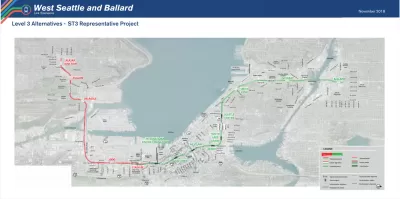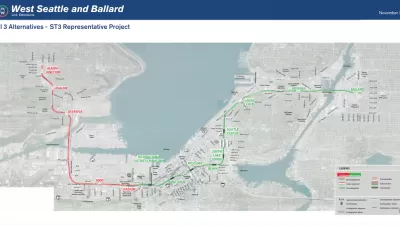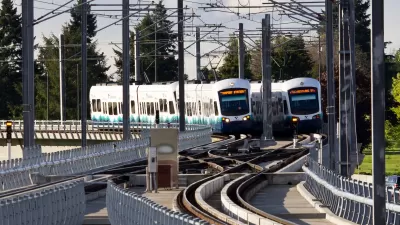Plans to extend the Sound Transit light rail system are moving forward. Elected officials have a big choice to make that will determine the cost and scope of the projects.

"Sound Transit has developed two complete alternative concepts for the West Seattle and Ballard light rail extensions," reports Stephen Fesler. "The alternatives marry together remaining segment alternatives that the Elected Leadership Group had winnowed down in October."
Fesler digs into the details of the alternatives proposed by Sound Transit, and offers this assessment: "On the basis of ridership and cost, it is not clear that the alternatives are more productive than the baseline alternative, but there may still be merit to the options that they present."
Elected officials met to discuss the alternatives a few days later, as detailed in a follow up article by Fesler, mostly agreeing with Fesler's estimates about the performance of each alternative. According to Fesler's assessment after the meeting, the choice essentially comes down to two options: one plan that includes funding from a third party, and one without.
The differences between the two versions of the project are substantial too: "The ST3 Representative Project alternative may hamstring the light rail system in the future as it expands, suppressing future ridership. Building the wrong type of crossing in Ballard may slow down trains in perpetuity. Building a cut-and-cover tunnel on 4th Ave S could heavily disrupt the community in Chinatown-International District and greatly impact businesses. And building a substandard light rail segment in SoDo could risk collisions and delays forever."
FULL STORY: Sound Transit Shares Complete Level 3 Alternative Concepts for West Seattle and Ballard Extensions

Planetizen Federal Action Tracker
A weekly monitor of how Trump’s orders and actions are impacting planners and planning in America.

Maui's Vacation Rental Debate Turns Ugly
Verbal attacks, misinformation campaigns and fistfights plague a high-stakes debate to convert thousands of vacation rentals into long-term housing.

San Francisco Suspends Traffic Calming Amidst Record Deaths
Citing “a challenging fiscal landscape,” the city will cease the program on the heels of 42 traffic deaths, including 24 pedestrians.

Amtrak Rolls Out New Orleans to Alabama “Mardi Gras” Train
The new service will operate morning and evening departures between Mobile and New Orleans.

The Subversive Car-Free Guide to Trump's Great American Road Trip
Car-free ways to access Chicagoland’s best tourist attractions.

San Antonio and Austin are Fusing Into one Massive Megaregion
The region spanning the two central Texas cities is growing fast, posing challenges for local infrastructure and water supplies.
Urban Design for Planners 1: Software Tools
This six-course series explores essential urban design concepts using open source software and equips planners with the tools they need to participate fully in the urban design process.
Planning for Universal Design
Learn the tools for implementing Universal Design in planning regulations.
Heyer Gruel & Associates PA
JM Goldson LLC
Custer County Colorado
City of Camden Redevelopment Agency
City of Astoria
Transportation Research & Education Center (TREC) at Portland State University
Jefferson Parish Government
Camden Redevelopment Agency
City of Claremont




























